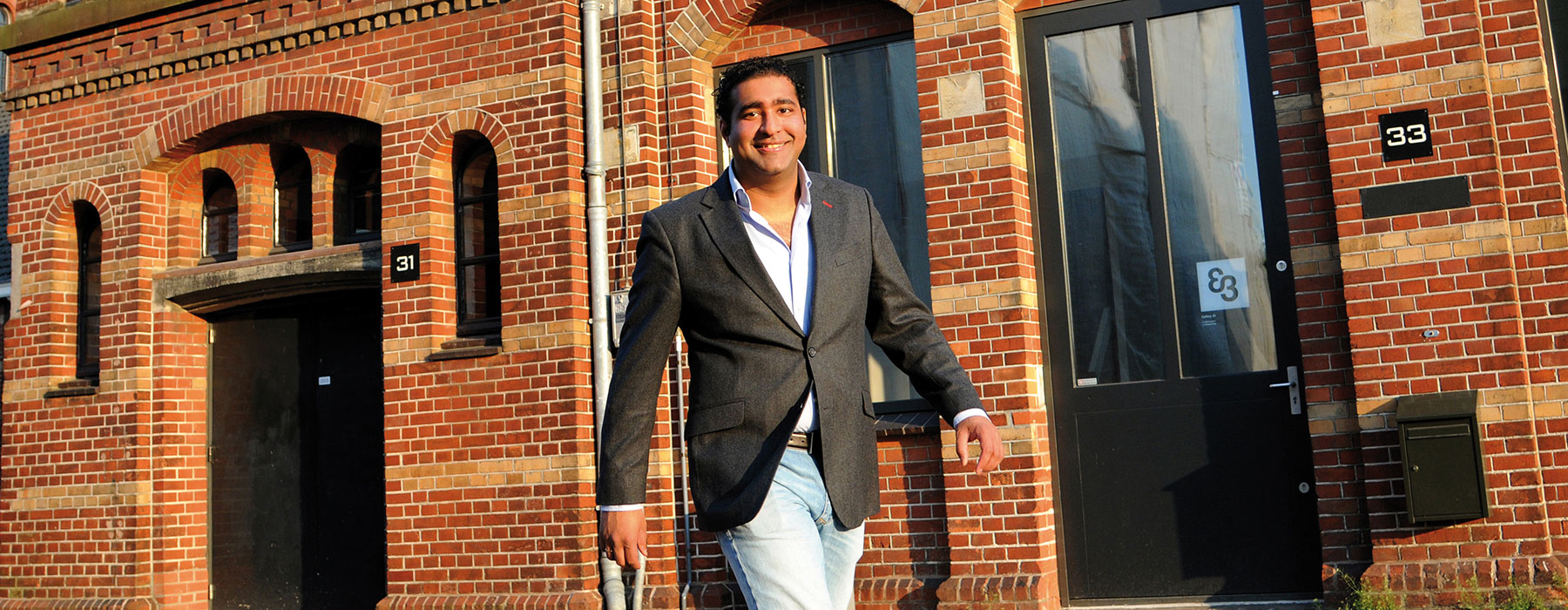NAME: RISHI LODHIA
COMPANY: CAMERAMANAGER.COM
IN THE NETHERLANDS SINCE: BIRTH
Rishi Lodia discovered his passion for business during his first year of study in Maastricht. While his fellow students took part-time jobs, he received 500 guilders from his parents – to start a business. Entrepreneurship was highly encouraged at home – in contrast to the unenthusiastic reactions of others around him. The university was also unimpressed by his entrepreneurism. But entrepreneurial blood will out, and he energetically and successfully pursued the opportunities presented by the (internet) market. His second company, Cameramanager.com, is active in Europe and he hopes that it will soon gain a foothold in Brazil. His success in the international market comes from the Asian way of doing business: hard work during the day and time for social contacts and enjoying oneself in the evening. He sees a good relationship with his business partners as essential.
1. How long have you been in The Netherlands?
I was born in Almelo in 1980.
2. How did you become an entrepreneur and why?
My family are real entrepreneurs. My grandpa saw opportunities in Africa and moved there from India in the fifties to start a number of businesses, together with his family. Unfortunately, they had to flee the country in 1972 during the dictatorship of Idi Amin. My father ended up in The Netherlands and married an Indian woman, my mother. She, too, came from a really entrepreneurial family who had been jewellers for generations. My parents had a variety of businesses in The Netherlands and so I learned to be an entrepreneur from a very young age! But it was during my first year studying international business administration in Maastricht, when I was 19, that I really discovered my passion for business. Instead of having to look for a student job I received five hundred guilders from my parents, as a stimulus to start a business. Together with a friend I successfully set up an internet company that provided tailor made, online solutions – but the real breakthrough came after starting our second business. We had a few security companies as clients, who indicated that their current, analogue camera systems weren’t satisfactory. We developed a revolutionary solution for camera surveillance, which can be managed entirely online: Cameramanager.com, the world’s first camera surveillance platform ‘in the cloud’. By always staying alert and responsive to the needs of the market we want to turn our product into a global success. Innovation and development play a key role in this. We have grown to become an international company operating in Europe and in Turkey, where we are market leader. We hope to get a foothold in Brazil this year.
3. Did you encounter problems when you wanted to become an entrepreneur?
One’s environment (excluding family) – that regards entrepreneurism as a risky existence and pushes you towards a corporate career as a lawyer or doctor or, worse still, as an accountant. Entrepreneurism is also a dirty word at the university. This attitude has fortunately changed for the better over the past few years. Entrepreneurship could still be better stimulated, but the realisation that the entrepreneur creates work for the professional has indeed grown as a result of our turbulent economy.
4. What are the differences between doing business in The Netherlands and in India?
In India, and all other Asian countries, you must first work on your business contacts. One first builds a good personal connection – and only then gets down to business. The Dutch are certainly good at establishing the first contact, but they then want to move quickly on to the deal. In Asia it’s different, you have to invest time in your relationships. I love the Asian way of doing business. When I’m in Istanbul, for instance, I work really hard all day but the evening is always dominated by social activities: sumptuous dining and getting to know each other better. One combines pleasure and business, because a good relationship with your business partners is essential.
5. What is typically Dutch when it comes to doing business and being an entrepreneur?
The Dutch want to record everything in contracts. I believe no other country has as many collection agencies as The Netherlands. Furthermore, the Dutch want to close the deal at the first meeting.
6. What have you taken from both the Indian and Dutch cultures?
Dutch transparency and directness – and the Indian way of building and maintaining relationships.
7. Would you ever go back to India?
Not to live there or start a business, but I do like to go to India to visit the family.
8. What are the secrets of your success?
Hard work, transparency, innovation, good relationships and always wanting to create something new rather than preserve the status quo.
9. What is your favourite fruit, and why?
Mango. I like everything about mangos – the fruit itself, but also fruit juices that contain mango.
10. What is your favourite Dutch product and/or place?
I’m a vegetarian and for this reason my favourite product is cheese.
My favourite location is the Westergasfabriek in Amsterdam.
TIPS from Rishi
1. Always think of creating – rather than consuming.
2. Create new products or services. Look around you: what annoys you? Could you improve or change that by making something new?
3. Believe in your product!
4. Try to inspire.
5. And if you want to do business internationally: find a partner who knows the ropes in that country.
Shortly behore the publication of this book it became known that Cameramanager.com had been taken over by Panasonic and that RIshi is now the CEO of Panasonic Cloud Management Services.
